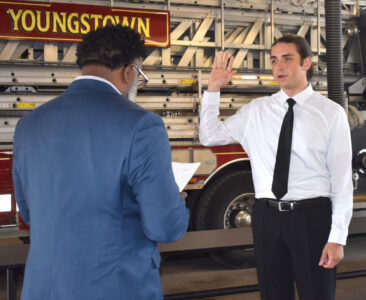Impact of 1963 Birmingham bombing endures
Emotional addresses in Alabama resonate with Valley students

Correspondent photos / Sean Barron Chris Stanley, an eighth-grade history teacher at Martin Luther King Jr. Elementary School in Youngstown, has an emotional moment of reflection in the 16th Street Baptist Church in Birmingham, Ala. on Tuesday. Stanley, who’s also part of Mahoning Valley Sojourn to the Past, heard presentations from the sisters of two of four girls killed in the bombing of the church Sept. 15, 1963.
BIRMINGHAM, Ala. — Jenna Gumina envisions herself as a greater activist, and she’s thankful to two women who have suffered their share of loss — and how they have handled it.
“We have the ability to (nonviolently) continue the fight for civil rights and social justice,” the 17-year-old Howland High School senior said. “The differences we have (as people) makes us the same as a whole.”
Jenna’s activism desire was whetted further after she heard presentations Tuesday from Lisa McNair and Sarah Collins Rudolph, whose sisters, Denise McNair and Addie Mae Collins, were two of the four girls killed in the 16th Street Baptist Church bombing Sept. 15, 1963. The others were Carole Robertson and Cynthia Wesley.
Jenna, who’s also part of Mahoning Valley Sojourn to the Past, was among those who heard McNair and Collins Rudolph’s often emotional presentations in the church.
Jenna added that hearing the women empowered her to encourage friends to join just and peaceful protests when necessary.
Collins Rudolph, who’s often referred to as “the fifth little girl,” was seriously wounded in the terrorist attack and required eye surgery. After a few months in the hospital, she was given a prosthetic eye after having been partially blinded by glass. Despite the trauma she endured, Collins Rudolph received no counseling, she recalled.
The psychological damage lasted longer, however, partly because she was filled with fear, especially when she returned to school. The years-long fear caused her to make some poor choices, but eventually she “heard about the power of redemption and was baptized,” Collins Rudolph explained.
“No matter what you go through, trust God. Don’t turn to drugs or alcohol,” she said, adding that she forgave the four bombers.
“My parents taught us to love one another as individuals,” said McNair, who recalled that her late father, Chris McNair, became the county’s first black state representative largely because he wanted to honor Denise via public service.
McNair said she’s convinced the 1997 Spike Lee film “4 Little Girls,” was a catalyst in bringing Bobby Frank Cherry and Thomas E. Blanton, two of the convicted killers, to justice in 2002 and 2001, respectively.
McNair also travels extensively to tell her family’s story and those of the other three girls.
Their message also resonated with Brittany Vernon, 17, another Mahoning Valley Sojourn member.
“They shared the same stories that I never heard,” she added.
Brittany explained that racism remains a sore subject for many people, but that she wants to tell others truthful information about it. She also hopes to contribute to future anti-racism workshops like those Mahoning Valley Sojourn to the Past members have conducted for many organizations and groups.
Earlier, the participants saw footage on the May 1963 Children’s March in Birmingham in which more than 4,000 young people — one as young as age 4 — were arrested in several days of peaceful protests against segregation.
One of those who took part was Joseph Selmon of Birmingham, who marched on his 11th birthday.
“I was running from the (water) hoses,” Selmon recalled. “I didn’t know the difference we were making at the time that it would change the world.”
Selmon encouraged the Sojourn participants to merely do what they feel is right in correcting societal wrongs.
The march’s key strategy was to fill the jails and overwhelm the city’s ability to enforce segregation. Rather than being fearful, the children sang songs and chants in jail, clearly demonstrating they “had the power,” Jeff Steinberg, the program’s founder and director, said.
Results of the 1963 Children’s March included ousting Eugene “Bull” Connor, the public-safety director, after his seventh term; passage of the 1964 Civil Rights Act to make segregation illegal; the initial hiring of three blacks in downtown stores; and the removal of “whites only” and “coloreds only” signs in public locations.
news@vindy.com
news@tribtoday.com




